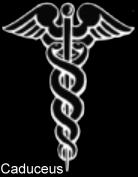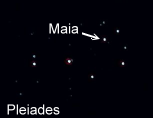

Page 1: Introduction
Page 3: Earth and Mars
Page 4: Jupiter and Saturn
Page 5: Uranus and Neptune
Page 6: Dwarf Planets
Page 7: Three Asteroids
Page 8: Sun and Moon
 Mercury
Mercury
|
Mercury (or Hermes in Greek) was the messenger of the gods and the god of travelers, boundaries, commerce, eloquence, communication, luck, trickery, and thieves. His winged sandals gave him great mobility and the ability to pass readily across boundaries, so he became the guide to souls going from the land of the living to the land of the dead (a psychopomp). His symbols are a rooster, tortoise, satchel, winged sandals, a wide-brimmed hat, and, in particular, the caduceus, a winged staff encoiled with two snakes. He is the son of Zeus and Maia (daughter of Atlas and Pleione, an Oceanid) who was one of the seven sisters, the Pleiades (see right). He was born at dawn in a dark cave on Mount Kyllene in Arcadia. About midday he jumped out of his crib, left his cave and made a lute from the shell of a tortoise. At dusk he went out and stole fifty cows from Apollo, killed two, cut them into twelve parts to sacrifice to the gods before returning to his cot. Apollo is a god and knew who stole his cattle but not what he did with them. Apollo came to search the cave, but Hermes snuggled down in his cot and pretended he didn’t even know what a cow was. Apollo was not convinced and took him before Zeus who commanded Hermes to show Apollo where he had hidden the cows. Hermes took Apollo to the place but tried to charm him by playing his lute. It evidently worked because Apollo agreed to take the lute in exchange for making Hermes divine keeper of herds. Thereafter they became good friends. |

|

|
 Venus
Venus
Ouranos was one of the beings created in the beginning by Gaia who then mated with Gaia to give rise to all later beings. Ouranos was a monster who feared that one of his children would displace him as Chief God, so as each was born he forced them back into Gaia′s womb. Eventually the pain was too great for Gaia and she implored her sons to help her. All were too afraid except for her youngest, Kronos, who lay in wait for his father, when he came to Gaia that night, and cut off his genitals and threw them far into the sea. They were still fertile and gave rise to the Furies, the Giants, and the Nymphs. From the foam created as the waves beat against a beach arose Venus (Aphrodite in Greek), the goddess of erotic love, and the giver of beauty and sexual attraction. She was herself very beautiful and she teamed up with Eros, the primal god of love, to inflict passionate love on anyone she chose. She married the crippled smith-god, Hephaistos, but she was an unfaithful wife, sleeping with many other men, but her constant lover was Ares, the god of war, for whom she bore several children including the twin sons, Phobos and Deimos. She inflicted irresistible love on gods and mortals, including Zeus who got his revenge by making her fall in love with a cowherd, Anchises. Anchises did not realise that he was making love to a goddess and was very worried when he found out next morning. Venus reassured him and told him she would bear him a son who would be brought up by mountain-nymphs and returned to him at the age of five. All would be well as long as he never revealed his son′s true mother. Many years later, when drunk, he revealed the secret and Zeus punished him with a thunderbolt, which crippled him. The son, Aeneas, went on to found Latium and hence the Roman race and is an ancestor of Romulus and Remus who founded the city of Rome.
Home Back to This and That